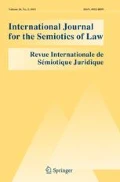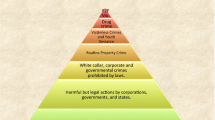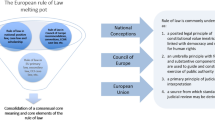Abstract
In this chapter I seek to rehabilitate and elaborate the so-called “mischief rule” of English law. I begin by interrogating two views of legal and constitutional interpretation which make symmetrical mistakes about legal interpretation: Larry Alexander and Emily Sherwin’s view in Demystifying Legal Reasoning and Jack Balkin’s in Living Originalism. Against these views I argue that the appropriate interpretation of laws is guided by the “mischief” the legislators were trying to remedy when they created the law and by what the legislators and the subjects of the law understand when laws are created or changed.
Similar content being viewed by others
Notes
My label.
I use “sign” loosely to refer to any symbolic representation.
Alexander and Sherwin claim to be following Grice, but so far as I can tell, Grice uses “utterer’s meaning” and “speaker’s meaning” somewhat similarly and contrasts both with “sentence meaning,” which I think is what Alexander and Sherwin mean by “utterance meaning.” For Grice on utterer’s meaning, see [16: 92, 105].
See also [1].
Searle goes on to give the following example of a thought which simply could not be communicated (or thought at all, for that matter) if the speaker did not possess a language with reasonably stable sentence meanings: “If only Roosevelt had not been so sick at the time of the Yalta conference in 1943, no doubt the situation in the Eastern European countries in the post-war decades would still have been unfortunate in the extreme, but it seems reasonable to suppose that the sequence of disasters and catastrophes that overcame those countries would at least have been less onerous than it in fact was.” How could such a communicative intention either be conceived or conveyed if the speaker did not have a stock of word-meanings which were relatively uncontroversial and secure?
On Alexander and Sherwin’s view it is hard to imagine an important sense in which speakers misuse words. If the only sense in which we can analyze meaning is according to the intentions of the speaker, then our practice of censuring people for “misusing” words is completely mistaken. Hearers only mishear; speakers never misspeak.
“Now, it is possible to imagine a regime of legal interpretation in which interpreters—judges, administrators, lawyers, and ordinary citizens—were instructed to interpret the legal rule in question as if it had been authored by a hypothetical person or body with certain characteristics. For example, the interpreter might be instructed to assume that the author(s) of the legal rules in question spoke standard English (as set forth in a particular dictionary), compiled with the orthodox rules of grammar (again, as set forth in a particular book on style and usage), and, where the dictionary gave a word two or more meanings, always adopted the first meaning listed.” [4: 137–138]. Notice the strange way Alexander and Sherwin advance the idea. Why would we assume that the author meant the first meaning in the dictionary rather than any other? Competent speakers of the language know how to draw meaning from the context to select the appropriate definition, as Alexander and Sherwin recognize in the case of rules. It seems that Alexander and Sherwin have constructed a straw man.
Other scenarios are also possible: what if legislators are given buttons to press to cast their votes, and one presses the “aye” button on accident, intending to vote “no”? Setting aside considerations of efficiency and formality (which can be substantial), I’m inclined to say that the legislator who made an honest mistake should have a chance to make it right. Perhaps, after a certain amount of time, it would make sense to not allow a legislator to recast a vote, but this seems more like a practical concern than a principled one.
The problem could also arise with law made by the executive and legislative branches.
It may be, as H. L. A. Hart argues, that law is whatever legal officials recognize as law. The view I advance can be made compatible with this view—it would still be possible, in principle, to identify the point in time at which a sufficient number of legal officials began treating something as law, therefore making it law. For Hart’s view, see [17: 100–102].
John Finnis speaks of the “double life” of the law—on one hand, “law” is a social fact of power and practice; on the other, “law” informs people’s practical deliberations about how they should act. When I speak of “law” in this paper I primarily refer to the first, sociological sense—law a set of intersubjective practices. See [12: 1602–3].
In this section I draw heavily on [3].
References
Alexander, L., and E. Sherwin. 2001. The rule of rules: Morality, rules, and the dilemmas of law. Durham: Duke University Press.
Alexander, L., and S. Prakash. 2004. ‘Is that english you’re speaking?’ Why intention free interpretation is an impossibility. San Diego Law Review 41: 967–996.
Alexander, L., and F. Schauer. 2007. Law’s limited domain confronts morality’s Universal Empire. William and Mary Law Review 48: 1579–1603.
Alexander, L., and E. Sherwin. 2008. Demystifying legal reasoning. Cambridge: Cambridge University Press.
Austin, J.L. 1962. How to do things with words. Oxford: Oxford University Press.
Azuelos-Atias, S. 2011. On the incoherence of legal language to the general public. International Journal for the Semiotics of Law 24: 41–59.
Balkin, Jack. 2011. Living originalism. Cambridge: Belknap Press.
Bobbitt, P. 1982. Constitutional fate. Oxford: Oxford University Press.
Bryne, A. 1996. On misinterpreting Kripe’s Wittgenstein. Philosophy and Phenomenological Research 56: 339–343.
District of Columbia v. Heller, 554 U.S. 570. 2008.
Drakeman, D. 2010. Church, state, and original intent. Cambridge: Cambridge University Press.
Finnis, J. 2000. On the incoherence of legal positivism. Notre Dame Law Review 75: 1587–1612.
Fish, S. 1982. Working on the chain gang. Critical Inquiry 9: 201–216.
Fish, S. 2005. There is no textualist position. San Diego Law Review 42: 629–650.
Fish, S. 2008. Intention is all there is: A critical analysis of Aharon Barak’s purposive interpretation in law. Cardozo Law Review 29: 1109–1146.
Grice, H.P. 1989. Studies in the way of words. Cambridge: Harvard University Press.
Hart, H.L.A. 1961. The concept of law. Oxford: Oxford University Press.
Heydon’s case. 1584. EWHC Exch J36, 76 ER 637. BAILII archive. http://www.bailii.org/ew/cases/EWHC/Exch/1584/J36.html. Accessed 10 June 2014.
Jemielniak, J. 2002. Just interpretation: The status of legal reasoning in the continental legal tradition. International Journal for the Semiotics of Law 15: 324–335.
Keck, T.M. 2004. The most activist supreme court in history. Chicago: The University of Chicago Press.
Knapp, S., and W. Michaels. 1982. Against theory. Critical Inquiry 8: 723–742.
Knapp, S., and W. Michaels. 1987. Against theory 2: Hermeneutics and deconstruction. Critical Inquiry 14: 49–68.
Knapp, S., and W. Michaels. 2005. Not a matter of interpretation. San Diego Law Review 42: 651–668.
Korematsu v. United States, 323 U.S. 214. 1944.
McConnell, M. 1995. Originalism and the desegregation decisions. Virginia Law Review 81: 947–1140.
McConnell, M. 1995. The originalist justification for Brown: A response to Professor Klarman. Virginia Law Review 81: 1937–1955.
Monaghan, H.P. 1981. Our perfect constitution. New York University Law Review 56: 353–396.
Prakash, S. 1998. Unoriginalism’s law without meaning. Constitutional Commentary 15: 529–546.
Raz, J. 1998. Two views of the nature of law: A partial comparison. Legal Theory 4: 249–282.
Raz, J. 2009. Between authority and interpretation. Oxford: Oxford University Press.
Restatement (Second) of Contracts §201.
Ripstein, A. 1996. Law, language, and interpretation. University of Toronto Law Journal 46: 335–344.
Rosen, G. 2011. Textualism, intentionalism, and the law of the contract. In Philosophical foundations of language in the law, ed. A. Marmor, and S. Soames, 130–164. Oxford: Oxford University Press.
Searle, J. 1994. Literary theory and its discontents. New Literary Theory 25: 637–667.
Sinnott-Armstrong, W. 2005. Word meaning in legal interpretation. San Diego Law Review 42: 467–492.
Smith, S.D. 1989. Law without mind. Michigan Law Review 88: 104–119.
Smith, S.D. 2004. Law’s quandry. Cambridge: Harvard University Press.
Smith, S.D. 2014. The rise and decline of American religious freedom. Cambridge: Harvard University Press.
Strauss, D.A. 2001. The irrelevance of constitutional amendments. Harvard Law Review 114: 1457–1505.
Wagner, Anne. 2002. Introduction: The (ab)use of language in legal discourse. International Journal for the Semiotics of Law 15: 323–324.
Whittington, K. 1999. Constitutional interpretation. Lawrence: University Press of Kansas.
Whittington, K. 2000. Dworkin’s ‘Originalism’: The role of intentions in constitutional interpretation. Review of Politics 62: 197–229.
Wilkinson, J.H. 2009. Of guns, abortions, and the unraveling rule of law. Virginia Law Review 95: 253–323.
Yablon, C.M. 1987. Law and metaphysics. Yale Law Journal 96: 613–665.
Zapf, C., and E. Moglen. 1996. Linguistic indeterminacy and the rule of law: On the Perils of misunderstanding Wittgenstein. Georgetown Law Journal 84: 485–520.
Author information
Authors and Affiliations
Corresponding author
Rights and permissions
About this article
Cite this article
Frost, D. Getting into Mischief: On What it Means to Appeal to the U.S. Constitution. Int J Semiot Law 28, 267–287 (2015). https://doi.org/10.1007/s11196-014-9387-4
Published:
Issue Date:
DOI: https://doi.org/10.1007/s11196-014-9387-4




